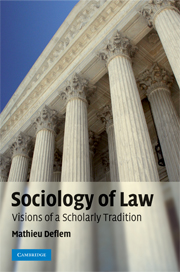Book contents
- Frontmatter
- Contents
- Preface and acknowledgements
- Introduction: sociology, society, law
- Part I Theoretical foundations of the sociology of law
- Part II Development and variations of the sociology of law
- 4 The theoretical move towards the sociological study of law
- 5 From sociological jurisprudence to sociology of law
- 6 Sociology of law and the antinomies of modern thought
- Part III Sociological dimensions of law
- Part IV Special problems of law
- Conclusion: Visions of the sociology of law
- Bibliography
- Index
4 - The theoretical move towards the sociological study of law
Published online by Cambridge University Press: 05 June 2012
- Frontmatter
- Contents
- Preface and acknowledgements
- Introduction: sociology, society, law
- Part I Theoretical foundations of the sociology of law
- Part II Development and variations of the sociology of law
- 4 The theoretical move towards the sociological study of law
- 5 From sociological jurisprudence to sociology of law
- 6 Sociology of law and the antinomies of modern thought
- Part III Sociological dimensions of law
- Part IV Special problems of law
- Conclusion: Visions of the sociology of law
- Bibliography
- Index
Summary
The classics of sociology have provided our discipline with a variety of analytical tools that remain useful to this day. Yet, the role of the founders of sociology in the development of an independent sociology of law is ambivalent. Ironically, this qualification applies least of all to the writings of Marx, whose work would become distinctly influential in the sociology of law even though he all but ignored the study of law. The case of Weber is more complicated. Weber's excursions on law were so detailed and rich from a technical viewpoint that they may have inadvertently hindered a proper sociological understanding and adequate reception by a later generation of sociologists. In the case of Durkheim, law was early on in his work a central but primarily methodological interest that reappeared only intermittently in his later work. Central sociological problems of law, such as the form of law under conditions of increasing rationalization and the integrative capacities of law in the light of increasing individualism, are always present in the works of Weber and Durkheim, so much so that they are not always treated separately in the form of a clearly defined specialty field. Besides, the specialization of subfields within sociology is a development that is distinct to modern sociology.
It may have been in part because of the not always clearly demarcated treatment of law in classical thought that modern sociology has only gradually been able to claim a distinct interest in the study of law.
- Type
- Chapter
- Information
- Sociology of LawVisions of a Scholarly Tradition, pp. 77 - 96Publisher: Cambridge University PressPrint publication year: 2008



